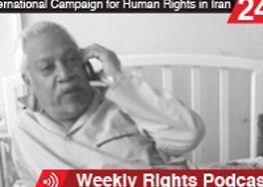Imprisoned Teacher Denied In-Person Visitation Rights
Zolaikha Biyabani, mother of Mohammad Davari, an imprisoned teacher and editor of Saham News, told the International Campaign for Human Rights in Iran that her efforts for in-person visits with her son remain futile. “It’s been four days since I returned from Tehran. I went for an in-person visit which wasn’t allowed. I had already applied a few times in the past but they wouldn’t agree. They said, ‘we won’t allow it.’ I told them – ‘Look I am a lonely woman coming from a far away town. It’s been three months since I saw my son. Let us see each other for new year [Nowruz] holiday.’ They said no. Then, they took my phone number. They said, when it’s [the right] time, we will call you to come. So I went and saw my son in the booth,” she told the Campaign.
Davari was arrested following Karroubi’s letter to the Assembly of Experts about the torture and rape of political prisoners inside Kahrizak Detention Center. A year after his arrest, and after phone calls from Ward 350 of Evin Prison were disconnected, Davari wrote a letter to his mother telling her not to come visit him anymore. “Because my mother is elderly and ill conditioned, traveling on a thousand-kilometer trip will jeopardize her health, and during each trip, I’m worried for days whether she returns safely or not. The limitation on booth-visits, which is 20 minutes at most, is not worth suffering the long distance trip,” wrote Davari in his letter, which was published on news websites.
Biyabani, who is from Khorasan and is ill, managed to come to Tehran after three months and visited her son through a booth on 28 March. “As you know, his health is not good in prison. But he talked nice so I wouldn’t worry. He was ill before. I asked him about his health. He said, ‘I am well. In this place there are doctors and everything.’ Before, he was saying ‘my back hurts, my leg hurts.’ His eyes are also having problems. Because when he went to war, his eyes got damaged. He is a wounded veteran. I said, ‘are you well now?’ He said, ‘Yes. I went to the doctor. I am alright now.’ I saw my son after three months. I wasn’t well before coming to Tehran,” she said about her son’s physical and mental condition. About meeting her son through a booth, Biabani said, “Mohammed said if you can, go get an in-person visit. He wanted me to stay to get an in-person visit. I said, ‘My dear son I am not well. I can’t stay. Let me go. When I am feeling better I will come back.’ He said, ‘Go then. Come back when you feel better.'”
“I request that my son be given prison leave so he can go to the doctor for his problems; to arrange for his affairs. A while ago his house was broken into, and his belonging were taken, his gas stove, washing machine, sofa…I don’t know whether it was the building construction workers nearby or some other people. A few pieces of his belongings that were left over I brought home with me. When I saw these things I was more upset,” she added.
“When my son was there he would pay my living expenses. He would buy my household essentials. Now I do these things myself. What can I do!” Biabani said.
Mohammad Davari, a wounded war veteran, head of the Training and Information Unit of the Iranian Teachers Organization, and editor of Saham News’ website, was arrested on 8 September 2009. After Davari was arrested and put under pressure to speak against Karroubi in a letter to Tehran Prosecutor, Karroubi accepted responsibility for all documents and films that were presented as documentation indicating the existence of torture and rape in Iranian prisons. He declared that Davari was only the cameraman and the interviewer, and said that he did not have any other role in this affair.

